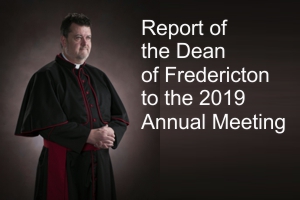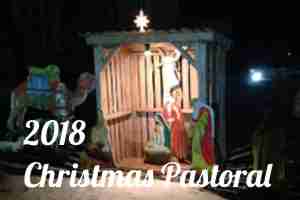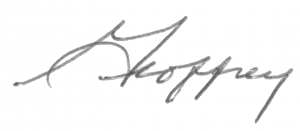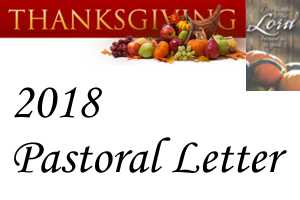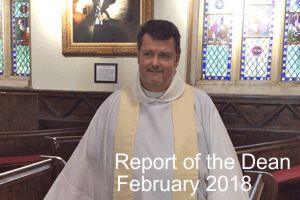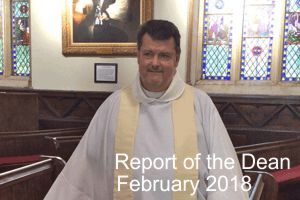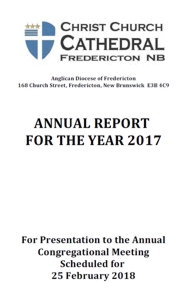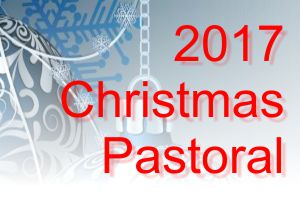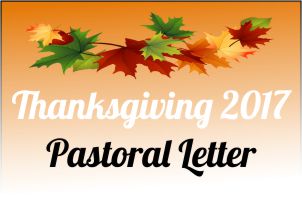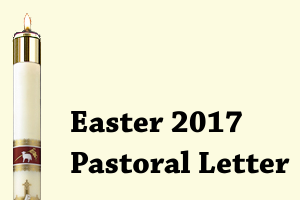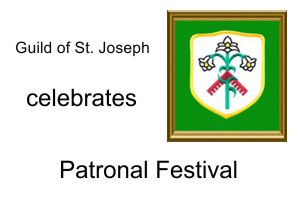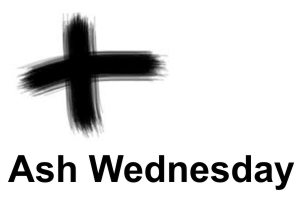Report of the Dean to the 2019 Annual Meeting
Introduction
Drummer and founder of the Spanish band Mägo de Oz (Wizard of Oz) 1 has been quoted on the meaning behind the name chosen for the Celtic metal band he formed in 1989. "Life is like a yellow brick road along which we travel with others as we search for our dreams."
Cathedral life is a little like that. People come and go, choosing to walk with us for a while or a long time, and during the journey we help one another be the Church. It is a privilege to call oneself Christian, perhaps most especially at a time in our western culture when so many are searching for meaning and purpose. Finding the Cathedral is relatively simple - just look up. The cross on the steeple of Christ Church Cathedral towers high above the City of Fredericton – not intended in a dominating way, but as reminder and sign pointing to where we have been and where we are going. God lives in our midst. Through the Spirit of his Son Jesus we are empowered to be more than we can be on our own. We are his Body. Our time on earth is limited and so, we are also granted the assurance and comfort that what we see is not all there is. The best is always yet to come.
Thanks
Each year I invest a few words to recognize those who so graciously walk the road with me. Christ Church Cathedral can only accomplish a purpose, a mission, in the City of Fredericton, the Diocese of Fredericton and beyond because of the many, many efforts of so many. Honourary assisting clergy play a valuable role providing sacramental ministry at times and in places where the Dean is not. Cathedral staff bring an intentional specialization of ministry to our life together. While our director of music, parish nurse and director of Christian formation are half-time positions, our ability to mission into those special areas of expertise far exceeds our real expenditure of resource required to engage them. Our office administrator and sexton facilitate a large part of the work we do together. And then there are those who minister among us for very little or no monetary compensation. Our Verger, choirs, those who work tirelessly so that we can reach out to those who need, hospital visitors, members of Bishop and Chapter and committees, readers of the daily office, servers, readers, greeters and welcomers. There are also those who quietly fill other gaps unknown and unannounced. Together we are the Church – an organized army making the Word of God visible in our community in countless meaningful ways.
Highlights
I won't attempt to comment on the detail of the variety of Cathedral accomplishments in 2018, leaving that to those closest to and responsible for them. Some highlights include: the Belize Mission trip in January/February; meaningful seasonal celebrations at Easter, Pentecost, and Christmas; the visit of Bishop Rob Hardwick as he cycled across Canada, the September corn boil, hosting a workshop of the annual conference of the National Trust (heritage Canada), celebrating the work of the Anglican Church Women in November. Reviews were conducted with Cathedral Staff in June as that becomes part of a regular annual rhythm. The November Diocesan Synod was cancelled with the news of the death of Bishop David Edwards' wife Janet. We continue to pray for our Bishop as he lives into his new reality.
Being the Cathedral Church
Above all, it is a goal I believe worth pursuing, that as the Cathedral of the Diocese we might continuously strive to be an example. The purpose statement on our web site, created by our Bishop and Chapter, is that we are: "An Anglican community for Christian leadership, worship, and mission in Fredericton, New Brunswick, Canada." While leadership is important for any church, it is even more so for the Cathedral. When the Diocese (the parishes of our diocesan church) look to the Cathedral, its my hope and prayer that they see an encouraging example of how church can be. Being a building for diocesan gatherings, a place out of the cold for the Bishop's cathedra, is only part of our calling. If at the Cathedral we employ a "best practices" approach in all that we do, we can in fact provide a leadership for the Anglican Church in the Province of New Brunswick that makes us all stronger, faith-filled and a light to the world.
The Last Twelve Months
We all have things we like to do. I get satisfaction from communication. For me, that includes writing, preaching and these days, many things technological, Some of that fuels my sense of accomplishment and I never mind being engaged in those tasks, even in my "spare" time.
Day to day necessities and the expectations of many consume the lion's share of my working hours. Each year I try to identify a small number of general areas that are growing edges for me and my ministry and perhaps also for the overall life of the Cathedral. In 2016 those were: "Christian Formation," "Stewardship" and "Mission." In 2017: "Hospitality, Welcoming and Invitation." In 2018: "Invitation and Welcoming" and "Stewardship." You might only take a look around to see if we have made progress in these areas. Nothing is ever perfect or completed, but I'm pleased with a comparison between where we were, where we are and where we might be better prepared to go.
A Look Into the Future
As part of the annual pattern for members of staff, I too sat with members of the Chapter Executive who conducted an annual review with the Dean. From those conversations we rested on three areas of emphasis for the coming year: 1) Stewardship, 2) Ministry with Young Families and a 3) Focus on Facilities. All of those ministry areas have something in common: its only through a high level of co-operation and acceptance that we can progress towards a place we might rather be as the Cathedral Church in the Diocese of Fredericton. I see my role, perhaps most of all, to help move us towards that co-operation.
My leadership style pleases some and frustrates others. I don't see the role of priest as the individual who tries to fulfill every need even when that temptation is strong. To use the analogy of a wall, I see myself more as the mortar, filling in the gaps rather than being the foundation or the bricks from which the wall gets its strength. Mortar needs to be flexible. It needs to support the bricks. Mortar also needs to be in a unique relationship with the individual bricks and the whole. That is the challenging calling to which I pray I can respond.
1) Stewardship
Perhaps one of the earliest lessons I learned about leadership is the power of example. Where stewardship is concerned, my best tool is leading where I can only hope and pray others will follow. Stewardship is not fund-raising. I'm terrible at fund-raising. When I preach and attempt to teach about Christian stewardship, I see the stress on the faces of those with whom I am trying to communicate. No one relishes conversations that shine a light on how we use (or don't use) the resources we have been given. Perhaps if we were able to make progress in understanding one simple reality, it would be the most effective influence on our stewardship, both corporate and individual. Nothing is ours. Its all a gift. What we call "ours" is only on loan.
So as a first line of leadership in the area of stewardship, I strive to practice what I preach. The standard of Christian giving is the tithe. "Tithe" does NOT refer to what we give to the Lord's work. The tithe is a 10% share of what God has given to us, which we, at a minimum, make available for God's work through the church. The Bible speaks of "tithes and offerings." Biblically, offerings are the extra beyond the tithe we are moved by gratitude to give. If every Christian took even half of the tithe seriously, "we" would never be discussing money! Instead, 20% of the givers at the Cathedral provide 80% of the income.
I tithe, not to be praised, and not only because I need to lead, but also because I became convinced early on in my income earning years that it is required of me. According to Statistics Canada, the Dean's personal income puts him at the bottom of the average income category among residents of the City of Fredericton. Yet 10% places me among the top 15 givers.
So, as a spiritual leader, I'm regularly disappointed that more of our number don't put works of faith higher in their list of what's important. And that's my job. My experience is that I don't miss what I give to the Lord. I'm blessed by it. The Church may be blessed by it, but I am blessed by it! I'll continue in that because I believe that is what all Christians are called to do. And while many will wiggle and counter with queries about whether calculations are on gross income vs net, whether other charitable giving counts towards giving to the Church, argue that a tithe is an Old Testament giving model or claim to have more expenses than the normal household, none of that matters. The result is the same. The Cathedral needlessly struggles month to month to meet the minimum expenses of its planned ministry.
There are literally thousands of stewardship best practices. Planned giving (effective and cost efficient tools for both short and long-term financial planning and charitable gifts) is one and seems to be a topic we avoid at all cost. I'm thankful that we have just now assembled a group (Stewardship Task Force) to consider ways we might positively influence our stewardship formation both individually and corporately. We have everything and more than we need to get the job done. What's lacking? How might we all pull together (co-operate) to move us from where we are to where we need to be? I'll continue to encourage something different, but its only by way of that seemingly always allusive co-operation that we'll move toward a different future.
2) Ministry with Young Families
The appointment of our Director of Formation is the one most forward steps in the direction of bringing a more intergenerational approach toour whole ministry and programme package. Every generation requires attention and brings its own set of expectations. The Archbishop of Canterbury, George Cary, once said that "the church is always one generation from extinction." I'm very conscious of the concern when we look around our church family and detect at least a couple, if not three generations, not well represented in our number. Its not difficult to understand why others express concern too. It can just as easily be argued that it says something about the effective lasting effect those past hay day times had on current membership demographics.
There are many answers to the reality of what we perceive to be the challenges in our demographic distribution. First, this is 2019 not 1970. While that may be obvious, I hear comparisons being made between the present and the past. The cultural context of the 1970's is gone. Recreating the program of past days or measuring our expectations against what we may have seen as past success is not helpful. There are forces at work in the culture not part of the picture of the past. To name only a few: parents parent differently and face an entirely different set of challenges; choices are far more numerous; attention spans are much shorter. Competition for the attention of both adult and child is fierce.


We're making better decisions about programming with younger families in mind. That's a step in the right direction. Several offerings like Godly Play, the Family Faith Fiesta and special worship events are all valuable additions to our efforts to reach out and engage the young. Ultimately, that element of co-operation is all important in the results of those efforts. You can help.
3) Focus on Facilities
The issue of making decisions on our facilities, namely the Memorial Hall and the Cathedral church itself, seems to be based in an assumption that these buildings are either too expensive or not being used to their full potential. While this issue is identified as a separate area of focus, it too is very much a matter of stewardship. The Cathedral has enormous significance both historically and spiritually. Memorial Hall has many strikes against it: its age and the need for upgrades and repairs; a minimum of usable spaces designed to current need; inaccessibility requiring many steps to reach the main level; a location that physically separates it from our worship centre. Still, as I indicated to some a little while ago, simply closing the Memorial Hall to cut expenses would indicate that we are no longer in business. Our hall is not used 100% of the time but it does "facilitate" our Monday to Saturday ministry – a long list if we take the time to count.
Heating, repair and maintenance are regarded as expenses targeted at "things" rather than "people." Our "facilities" costs are called that because they "facilitate" (make possible) ministry with people. Consider our expenses in 2018. Note that the amount spent on buildings is about 17% of total. One 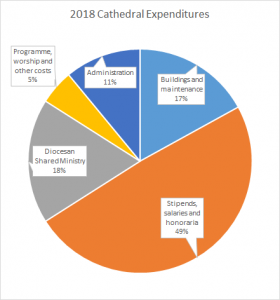
Giving patterns limit what we could really be all about, just covering or (as in 2018) not quite covering the bare minimum ministry plan. What a different picture we could paint for God if financially we all got serious about the ministry at Christ Church Cathedral – our faith expressed through our Church!
Conclusion
All in all an eventful year. Challenges are ahead. With appreciation to all for their important part in being not just a worshiping body but also the Body of Christ in so many ways, I pray that in the year to come the Lord will bless us, keep us and challenge us in his service.
Respectfully submitted,
Geoffrey, Dean of Fredericton
1. Mägo de Oz <magodeoz.com>
2. The Barna Group: <barna.com>
3. ALPHA USA: <alphausa.org>
4. Natural Church Development (NCD Canada): <ncd-canada.com>
5. ALPHA Canada: <alphacanada.org>
6. Project 2045 Terms of Reference <cccath.ca/home/groups-and-committees>
